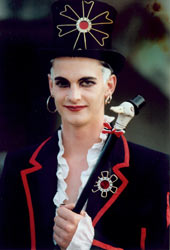 Clive Higgins attended one day of school in his life. His mum was careful to drop him off ceremoniously for his first day of kindergarden, and less careful to pick him up. He decided to wander home once the streetlights came on, and was eventually brought in by a police officer to the arms of his unfazed, if embarrassed, mother, Sydney.
Clive Higgins attended one day of school in his life. His mum was careful to drop him off ceremoniously for his first day of kindergarden, and less careful to pick him up. He decided to wander home once the streetlights came on, and was eventually brought in by a police officer to the arms of his unfazed, if embarrassed, mother, Sydney.
Sydney’s actions should not be misconstrued. She loved her son very much, and made frequent, weak attempts to care about the things most parents did, but she just couldn’t understand the excitement of taking her poor boy to sit bored at a desk and while away his finest hours. She remembered to take him to school that once, but from then on, school just didn’t enter her mind. She had checked that duty off of her list.
Clive was never neglected.
Sydney, a tattooed pin-up model whose wild streak had held over from her own childhood, did not have a 9 to 5 work schedule, and, in fact rarely had commitments she couldn’t attend to with her son in tow.
Clive spent many an exciting day watching his mother as her hair was combed and coloured, her skin painted and accented with glitter in just the right places. He would watch grown men shape and reshape objects in the set, flick coloured gels in front of his eyes or watch workers slip them onto lights high up on metal trees. He watched as wind was created indoors, as glistening jewels of water were added to his mother’s face to make her cry, as his mothers body was shaped and reshaped to just the right angle, her head re-cocked, her smile tilted just so.
It was a magical, slow-moving live performance, watching lasting art created before his eyes.
On the days between shoots, Sydney loved to take walks with Clive at the zoo, where the whole family had season passes. Sidney liked the bird-house best, in spite of its smell. For Clive, nothing could beat the crazy, screeching excitement of the monkey house…nothing, perhaps, except for the tense prowl of a lioness in an enclosure just large enough to pace.
When he could come, Clive’s father, Hank, would not allow them to leave without a quick trip through the fish tunnel, where, he said, if you were lucky, you could witness dazzling tricks of acrobatics never possible on land or air. When he was old enough, he would protest that an acrobat, by definition, performs in air—these fish, then, must be aquabats—but when he was young, he was content to gaze in wonderment at brightly coloured fish, and disquietingly colourless sharks.
Although he was frequently out of town, Hank was a dedicated family man. He and his wife were a couple with a fresh outlook. They got out together, they had fun, and they tacitly agreed never to properly learn how to be adults.
For his part, Hank made his living playing games. A professional contact juggler, Hank spent most of his days surrounded by swarms of children, each and every one of them amazed at his ability to move crystal balls around each other and his body with the sensual ease of a ballet dancer. Hanks skills were not limited to contact juggling. He was quite apt at traditional juggling, and could keep 5 objects of varying shapes and weights in the air, including fire.
He was a skilled fire dancer, could perform amazing feats with poi or burning nun-chucks, or flaming hulahoops, or burning whips. When Clive was lucky, Hank would come home from a juggling exhibition in some remote location, and snatch Clive and Sydney away to a clearing in the woods, where they would camp out for a day or two, and the family would sing and dance, roast marshmallows and chant around their campfire.

